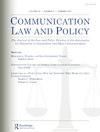偏执的机器人:言论自由与隐私在美国抵抗侵入式机器人电话
IF 0.2
Q4 LAW
引用次数: 0
摘要
这篇文章讨论了美国政府监管自动电话的尝试——这种自动的、经常是欺诈性的信息每年发送到数十亿公民的手机上。最早针对不请自来的电话骚扰的规定被国会和监管机构定位为对家庭隐私的内容中立保护。多年来,这种观点几乎没有引起争议,但最近却被语音电话提供商要求的误导性言论自由分析所取代,后者反过来利用这种论点来削弱隐私保护。本文认为,旨在限制自动电话的法规和法规是为了保护消费者隐私而不是电话营销人员的言论相关权利而制定的。然而,电话营销人员认为这种限制是对言论自由的违宪侵犯。司法部门的回应是试图平衡隐私和言论,而如果各方都重新审视相关法规和条例的隐私价值,这种分析就不应该是必要的。本文章由计算机程序翻译,如有差异,请以英文原文为准。
Paranoid Androids: Free Speech Versus Privacy in America’s Resistance Against Intrusive Robocalls
Abstract This article discusses attempts by the American government to regulate robocalls – the automated and often fraudulent messages that are sent to citizens' phones by the billions every year. The earliest regulations against uninvited telephone solicitations were positioned by Congress and regulatory agencies as content-neutral protections of privacy in the home. This perspective aroused little controversy for years, but it has recently been overtaken by misleading free speech analyses demanded by robocall purveyors, who in turn use such arguments to chip away at privacy protections. This article argues that regulations and statutes intended to restrict robocalls were enacted with the intent of protecting consumer privacy over the speech-related rights of telemarketers. However, telemarketers have adopted the argument that such restrictions are unconstitutional infringements on free speech. The judiciary has responded with tortured attempts to balance privacy and speech, when that sort of analysis should not be necessary if all parties revisited the privacy values of the relevant statutes and regulations.
求助全文
通过发布文献求助,成功后即可免费获取论文全文。
去求助
来源期刊
CiteScore
0.60
自引率
33.30%
发文量
7
期刊介绍:
The societal, cultural, economic and political dimensions of communication, including the freedoms of speech and press, are undergoing dramatic global changes. The convergence of the mass media, telecommunications, and computers has raised important questions reflected in analyses of modern communication law, policy, and regulation. Serving as a forum for discussions of these continuing and emerging questions, Communication Law and Policy considers traditional and contemporary problems of freedom of expression and dissemination, including theoretical, conceptual and methodological issues inherent in the special conditions presented by new media and information technologies.

 求助内容:
求助内容: 应助结果提醒方式:
应助结果提醒方式:


